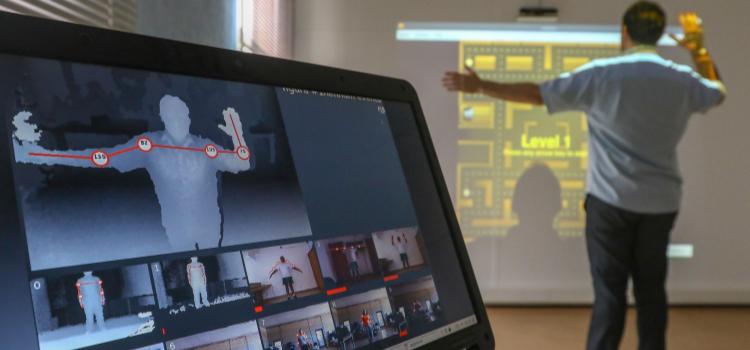
Spin-Off seeks to bring technology to market for motor recovery of patients
By Kátia Kishi
Incubated at Unicamp’s Technology-Based Business Incubator, the Bioxthica is one of the examples of a new set of Spin-offs, created from research carried out at the university to bring technological solutions to the market with problems of high impact on society. The company is a Spin-off of BRAINN (Brazilian Institute of Neuroscience and Nanotechnology), one of FAPESP’s Research, Innovation and Dissemination Centers (RIDC) at Unicamp, and its founding partner is Alexandre Brandão, an associate researcher at the BRAINN.
The Spin-off develops, together with BRAINN, solutions in the area of health informatics with virtual reality interfaces and wearable devices for Human-Computer Interaction. In other words, interactivity activities with virtual environments based on motor and cognitive stimuli that can contribute to the motor recovery of patients undergoing rehabilitation.
Among the results of the solution under development, the group has already developed two software, registered by the University of Campinas (Unicamp) and the Federal University of São Carlos (UFSCar). These are the e-House and the e-Street solutions that simulate residential and urban environments and reproduce activities of daily living, such as stationary walking to simulate crossing streets and circulating cars in the virtual city e-Street.
The intention is that patients control the virtual environments from movements related to rehabilitation and under the guidance of a physical therapist or occupational therapist (specialist in kinesiology). “For example, if the goal is to rehabilitate the gait pattern for the patient to relearn the movements related to walking and he is unable to make this complete gait pattern, the partial movement he can do is associated with walking in this virtual environment (e-Street). It makes that the patient experience a sensation of moving forward without spatial displacement. “, details the researcher.
Brandão recalls that his career at BRAINN started with a Young Researcher FAEPEX (Support Fund for Education, Research and Extension of UNICAMP), continued with a Fapesp Technical Training scholarship and today he is a postdoctoral researcher, motivated by the need to transfer technology for society: “The technology is under development, in the testing phase, but as we receive demands from people who want to use the technology, we chose to submit an incubation project at Incamp to create a BRAINN Spin-off and start study how to raise funds to transform the technology into a final product, take it to the market and continue research and development of new solutions sustainably”.
This virtual reality research applied to neurofunctional recovery has the collaboration of other states (UNESP and USP) and federal (UFSJ and UNIFESP) universities. Among these partners is the CeMEAI, another FAPESP RIDC center – CeMEAI, the Center for Research in Mathematical Sciences Applied to Industry, based at the Institute of Mathematics and Computer Science (ICMC – USP).
BRAINN, a RIDC Fapesp at Unicamp
The São Paulo State Research Support Foundation (Fapesp) maintains a particular program that promotes, for up to 11 years, the Research, Innovation and Dissemination Centers (RIDCs) in different fields of activity. In all, there are 17 centres with the mission of raising the bar of multidisciplinary research, whether in basic or applied research, to transform the economic and social ecosystem in the state of São Paulo through technology transfer and extension activities.
Among the 17 CEPIDS, there is BRAINN, based at the Neuroimaging Laboratory – Faculty of Medical Sciences (FCM) of Unicamp and coordinated by neurologist Fernando Cendes. The Brazilian Institute of Neuroscience and Neurotechnology aims to develop new methods and techniques aimed at the prevention, diagnosis and treatment of debilitating brain diseases, especially epilepsy and stroke.
BRAINN currently has 63 researchers from different fields conducting 137 subprojects that have already generated five patents and 14 software registrations. In addition to Bioxthica, Hoobox is another spin-off company from BRAINN, also incubated at Incamp.


